Scratch TOW 2A 1/3-Scale Antitank Missile Original Design / Scratch Built
Scratch - TOW 2A 1/3-Scale Antitank Missile {Scratch}
Contributed by Larry Brand
| Manufacturer: | Scratch |
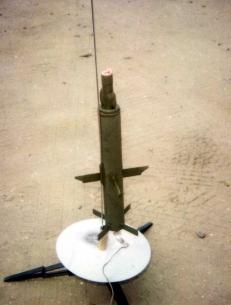
Brief:
Scale modeling of the TOW antitank missile is a challenging rocketry project; I
don't see that it has been attempted before. It is an "8FNNC"
configuration, 8 Fins No Nose Cone, with a blunt end that can't be good for
aerodynamics and that has to be custom crafted. Add to this a very far forward
CP requiring lots of nose weight that would be expected to further degrade the
flying qualities of an already draggy rocket. Not much fun to fly something
like this usually. I built this 1/3-scale model only to verify CP and CG for a
full-scale K445-powered TOW 2A project I am starting. I needed to know just how
much nose ballast the model would require and if it would even be practical to
try to model. The "real" TOW 2A solves this balance problem easily
with its 35lb shaped-charge warhead.
Construction:
I'm not usually into scale modeling, but the TOW-2A antitank missile with its
long nose-probe fuse caught my eye as something interesting to do with the
nose-mounted parachute mortars I had been experimenting with (see
"Aquafina" and "Bad Dad" examples on this website). The
1/3-scale balance-test model was built for D12 and E30 24mm power using a
2" postal mailing tube as the hull. Sort of novel is the use of the
plastic end caps of the tube as ready-built centering rings for the 24mm motor
tube that runs the full length of the rocket with the "nose-fuse"
forming the parachute mortar. The forward centering ring also forms the blunt
nose of the missile. The model is thus a "rocket-in-rocket" design.
The full-scale model will utilize 6" tubing and a 54mm motor
tube/parachute mortar.
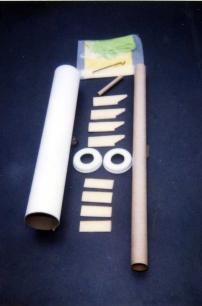
The construction is straight-forward. Five-minute epoxy was used throughout. 8 fins cut from 1/16" basswood and laminated on one side with 1/64" plywood, one 14.25" x 2" section of mailing tube, the two plastic end caps from the mailing tube with the 1" diameter reinforcing "dimples" cut out from their centers with an X-Acto knife, one 18" section of 24mm motor tubing (I originally used Estes BT50 tubing, which was a big mistake), an Estes motor hook, and an 18" Top Flite nylon chute. Assembly sequence:
- Fin sets glued onto the body tube flush with the base (tail vanes) or 6 1/8" from the base (wings), and 45 degrees apart. Vanes are each 2" x 7/8", wings are each 2 3/4" x 1 1/8" (diagonal tip is inset 1/4" from leading/trailing edges). The fin base attachment points were reinforced with 3/4" bits of popcicle stick scrap.
- The 18" long motor tube is fitted with an Estes motor hook on the aft end in the usual fashion. Motor tube is pierced 6" from the front end and 30" of parachute cord is passed through and knotted/epoxied in place; this becomes the recovery system shock cord.
- Aft plastic mailing tube cap is epoxied in place after roughing with sandpaper and notching the opening in this "centering ring" to accommodate the motor hook.
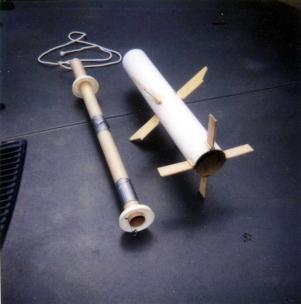 The motor tube with epoxy applied to the aft end is now inserted
from the front end, passed through the aft end cap, followed by the forward
plastic mailing tube cap is passed BACKWARDS over the protruding front end of
the motor tube and epoxied in one operation to the motor tube and to the end of
the mailing tube, providing a short, flat, fixed "nose cone". This
all has to be done at once because the front and end caps are the only points
of attachment and centering for the central motor/parachute tube.
The motor tube with epoxy applied to the aft end is now inserted
from the front end, passed through the aft end cap, followed by the forward
plastic mailing tube cap is passed BACKWARDS over the protruding front end of
the motor tube and epoxied in one operation to the motor tube and to the end of
the mailing tube, providing a short, flat, fixed "nose cone". This
all has to be done at once because the front and end caps are the only points
of attachment and centering for the central motor/parachute tube.- A 3" long 1/4" launch lug is epoxied in place along side one of the wings, with the forward end extending exactly 1.5" past the wing leading edge; the forward end of the launch lug gives 1-calibre stability, and is the balance point for the model loaded with a 45g Aerotech E30 motor. This is achieved by adding 60g of lead fishing sinker ballast to the 120g rocket airframe (epoxied and duct-taped in un-scale fashion to the sides of the "nose fuse"! There is probably a more elegant and less ugly way to add the nose ballast, but for now you'll just have to eat the scale points.
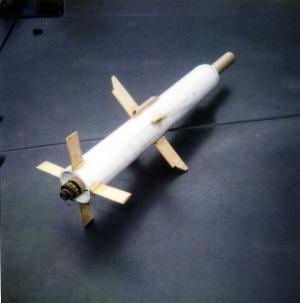 The 1/3 scale prototype was painted after the 2nd test flight in
Testors flat olive drab for a military (although non-scale) appearance. The
actual TOW missile is finished in an uncool and quirky patchwork of bright
metals and protective blue, lime, and gray primer coatings (since it lives its
life in a sealed transporter launch tube and nobody sees what it looks like).
The 1/3 scale prototype was painted after the 2nd test flight in
Testors flat olive drab for a military (although non-scale) appearance. The
actual TOW missile is finished in an uncool and quirky patchwork of bright
metals and protective blue, lime, and gray primer coatings (since it lives its
life in a sealed transporter launch tube and nobody sees what it looks like).
Flight:
Simulation based on a guesstimated Cd of 1.25 gave a 10G boost of 340' at 135
mph on a D12-5--about the same performance expected for an Estes Big Daddy on
this motor. Amazingly, the first flight with this motor gave a flight that was
visibly much higher and faster than any Big Daddy--not the draggy pig I had
expected at all. Boost was straight up and perfectly stable. Chute popped out
right at apogee and descent was brisk but soft enough that I didn't break off a
fin as I thought eventually might happen.
I made an additional flight on the D12, perfect again, and decided that the balance point was good enough to apply to the full scale version. On the third test flight with a D12-5, the ejection charge blew the motor tube apart, sending the forward section with the chute out the front and the aft section with the spent D12 out the back, the twin plastic end caps slowly spiraling down like miniature Frisbees. The empty body tube floated gently down and landed with no damage or fin breakage. Cause was a parachute packed too tight and failure of the thin-walled BT-50 tubing at its unsupported midpoint. I replaced the BT-50 tubing with thicker-walled 24mm motor tubing, which I should have used in the first place, and epoxied everything back together. The problem has not recurred. I never did fly it on an E30...it just flies too darn well on the D12-5 to need one. I am now using an estimated Cd of 0.85 to plan flights and that seems about right.
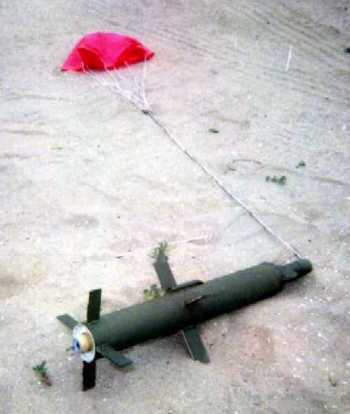 Summary:
Summary:
All things considered, the 1/3-scale TOW-2A is an easily built and great flying
scale missile. It would be a good candidate for a club contest or the NARTREK
Silver requirement, since there's lots of scale documentation on the Web.
Except for the parachute, it takes a couple of hours and about $5 to scratch
build -- how many 1/3-scale rockets can claim this, and fly well on a D12?
PROs: I have been just amazed at how well the TOW 2A performs, despite the blunt nose, the weight and all those fins. In retrospect, maybe this isn't so surprising, since it was designed by "real" rocket scientists to do just that. I am using the dimensions and balance points to design the full-scale high-power model. It is fun to fly, sturdy, and gets a lot of "Whatsat? Wherdjagethat?" comments at the field. It goes together quickly and is dirt-cheap to scratch build. The open-ended parachute mortar works great. It should really cook on an E30-7 or F24-7 (Sims say 1000' at 275 mph).
CONS: As a scale model, it still has a way to go--the huge fishing sinker weights need a better home (I'm working on it), and the aft fins should probably be attached through-the-wall to the motor tube because I finally did break a couple off. The biggest scale limitation will be tough to fix--the twin motor exhausts on the actual TOW missile exit amidships, just aft of the wings. This would be really tough to do in a model, so the TOW will remain a difficult scale rocketry project if it's scale points you're after.
 |
 |